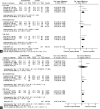FSH dosage effect on conventional sperm parameters: a meta-analysis of randomized controlled studies
- PMID: 31274479
- PMCID: PMC7275804
- DOI: 10.4103/aja.aja_42_19
FSH dosage effect on conventional sperm parameters: a meta-analysis of randomized controlled studies
Abstract
Follicle-stimulating hormone (FSH) represents a therapeutic option in normogonadotropic patients with idiopathic oligozoospermia. The aim of this review was to evaluate the possible dose- and drug-dependent efficacy of FSH treatment on conventional sperm parameters. We performed a comprehensive systematic review via a meta-analysis of all available randomized controlled trials, in which FSH administration was compared with placebo or no treatment when administered to normogonadotropic patients with idiopathic oligozoospermia. Of the 971 articles that were retrieved, 5 were finally included, including a total of 372 patients and 294 controls. Overall, FSH treatment was effective in ameliorating the sperm concentration, total count, progressive motility, but not normal forms. On the basis of the weekly dosage, the studies were classified into those using low (175-262.5 IU per week), intermediate (350-525 IU per week), and high (700-1050 IU per week) doses. At low doses, FSH improved only sperm motility. At intermediate doses, FSH ameliorated sperm concentration and morphology. Total sperm count and progressive motility showed a trend toward the increase. At high doses, FSH increased sperm concentration, total sperm count, and progressive motility. Sperm morphology showed a trend toward the increase. Finally, both highly purified FSH (hpFSH) and recombinant human FSH (rhFSH) improved sperm concentration, total sperm count, progressive motility, but not morphology. No different efficacy was observed between these two preparations. This meta-analysis provides evidence in favor of high FSH doses. The FSH efficacy was not related to the preparation type (recombinant vs highly purified). Further studies are needed to evaluate the effectiveness of long-standing treatment regimes.
Keywords: follicle-stimulating hormone; male infertility; oligozoospermia; sperm concentration; sperm count.
Conflict of interest statement
None
Figures





References
-
- World Health Organization. Report of the Meeting on the Prevention of Infertility at the Primary Health Care Levels. Geneva: World Health Organization; 1983.
-
- Valenti D, La Vignera S, Condorelli RA, Rago R, Barone N, et al. Follicle-stimulating hormone treatment in normogonadotropic infertile men. Nat Rev Urol. 2013;10:55–62. - PubMed
-
- Duca Y, Calogero AE, Cannarella R, Condorelli RA, La Vignera S. Current and emerging medical therapeutic agents for idiopathic male infertility. Expert Opin Pharmacother. 2018;8:1–13. - PubMed
-
- Barbonetti A, Calogero AE, Balercia G, Garolla A, Krausz C, et al. The use of follicle stimulating hormone (FSH) for the treatment of the infertile man: position statement from the Italian Society of Andrology and Sexual Medicine (SIAMS) J Endocrinol Invest. 2018;41:1107–22. - PubMed
Publication types
MeSH terms
Substances
LinkOut - more resources
Full Text Sources
Other Literature Sources
Medical

